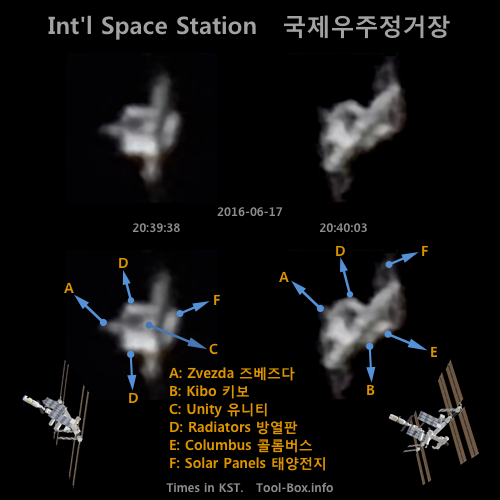Tracking ISS with a telescope
Posted by Wesley on
International Space Station observed on June 17, 2016
Directly imaging a fast-moving object in the sky like ISS by tracking it manually becomes more difficult with higher magnification. I could barely manage it with the Canon SX50 HS camera with 1.46"/pixel resolution. Using iPhone 6S Plus on the NexStar 6SE telescope with a 9mm eyepiece gives 0.31"/pixel resolution, making the field of view nearly 5 times narrower. Indirect method, which images the moment when the ISS passes in front of another celestial object, is easier because the telescope is focused on a fixed location. This is what I did a year ago. But such opportunity is much harder to come by, so I eventually decided to give the direct method a try with the telescope.
There were many uncertainties, such as what camera settings I should use on my iPhone and whether the telescope's motors would be fast enough. I would have to make guesses and hope for the best. To increase the chances of catching the moments at a high resolution when it entered the view, I used the 4K (3840x2160, 8.3MP) 30fps video recording mode with highest ISO and fastest shutter speed possible. One thing I did manage to "tie down" was the iPhone itself. The Universal Smart Phone Adapter from Modern Photonics that arrived in the mail just in time was the best solution I tried for attaching the phone to any eyepiece I had.
In the end, I was able to capture 22 frames in total out of about 100 seconds of recording. Targeting the space station with a non-magnified finder scope turned out to be quite difficult and focusing was also somewhat tricky. I need more practice to nail these down better. Fortunately, the motor was more than fast enough and the camera settings worked out. Plus, the processed results already outdid the ones from SX50 HS - major parts of the station are much more recognizable. They also explain what I was looking at in the old blurry shots. Looks like I'll be trying more of this in the future.
Telescope: Celestron NexStar 6SE + X-Cel LX 9mm eyepiece
Device: iPhone 6S Plus (afocal)
Settings: 29mm - ISO 720 - 1/1400s - f/2.2
Filters: None
Location: Naju, Korea (time in KST)
Stacked with PIPP 2.5.6 and RegiStax 6.1.0.8
#1: 9 photos @ 2016-06-17 20:39:38
#2: 5 photos @ 2016-06-17 20:40:03
Defined tags for this entry: astronomy, Celestron NexStar 6SE, iPhone 6S Plus, ISS, satellite, telescope